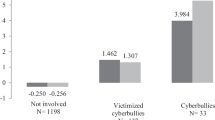Abstract
The explosion of online Social Networking Sites over time has its benefits as well as its risks. A potential risk is the fact that so many individuals have become victims of aggressive and cyber-bullying acts via Online Social Networking Sites. In the paper, the aim of this study is to analyse the correlation between Internet addiction and Aggressive Behavior Among the Namibian University Students. Based on statistical analysis the paper concluded that there is a worthwhile correlation between Internet addiction and Aggressive Behaviour and a sizable majority of the students who participated in the study suffer from moderate addiction problems due to their Internet usage. Also, the results indicate that the two most prevalent forms of aggression among the majority of the students are hostility and Physical Aggression.
Access this chapter
Tax calculation will be finalised at checkout
Purchases are for personal use only
Similar content being viewed by others
References
Frangos CC, Frangos CC (2009). Internet dependence in college students from Greece. Eur Psychiatry 24(Suppl 1):S419
Carpenter DO, Nevin R (2010) Environmental causesof violence. Physiol Behav 99(2):260–268
Cheung LM, Wong WS (2011) The effects of Insomnia and internet addiction on depression in Hong Kong Chinese based adolescents: an exploratory cross-sectional analysis. J Sleep Res 20(2):311–317
Young KS (2010) Clinical assessment of Internet addictedclients. In: Young K, Nabuco de Abreu C (eds), Internet addiction: A handbook and guide for evaluation and treatment. Wiley, New York, pp. 19–34
Widyanto L, McMurran M (2004) The psychometric properties of the internet addiction test. CyberPsychol Behav 7(4):443–450
Young KS (1998) Internet addiction: the emergence of a new clinical disorder. CyberPsychol Behav 1(3):237-244
Griffiths MD (2000) Internet abuse and internet addiction in the workplace. J Workplace Learn 22(7):463–472. https://doi.org/10.1108/13665621011071127
Griffiths MD (2000) Internet addiction: time to be taken seriously? Addict Res 8(5):413‐418
Nath R, Chen L, Muyingi HL, Lubega JT (2013) Internet addiction in Africa: A study of Namibian and Uganda college students. Int J Comput ICT Res 7(2):9–22
Liu T, Potenza MN (2007) Problematic Internet use: Clinical implication. CNS Spectrum 12(6):453–466. https://doi.org/10.1017/S1092852900015339
Leung L (2007) Stressful life events, motives for internet use, and social support among digital kids. CyberPsychol Behav 10(2). https://doi.org/10.1089/cpb.2006.9967. Retrieved on https://www.liebertpub.com/doi/abs/10.1089/cpb.2006.9967
Wolfling K, Muller K, Beutel M (2010) Diagnostic measures: scale for the assessment of Internet and gaming addiction. In: Young K (ed) Internet addiction: the emergence of a new clinical disorder. Cyberpsychol Behav 1(3):237–244
Beard KW, Wolf EM (2001) Modification in the proposed diagnostic criteria for Internet addiction. CyberPsychol Behav J 4:377–383
Chiu S-I, Hong F-Y, Chiu S-L (2013) An analysis on the correlation and gender difference between college students’ Internet addiction and mobile phone addiction in Taiwan. ISRN Addiction, vol 2013, Article ID 360607, 10 pp. https://doi.org/10.1155/2013/360607
Choi J, Hwang SY, Jang KE (2008) Internet addiction and psychiatric symptoms among Korean adolescents. J Sch Health 78(3):168–171
Mehroof M, Md G (2010) Online gaming addiction: The role of sensation seeking, self-control, neuroticism, aggression, state anxiety, and trait anxiety. Cyberpsychol Behav Soc Netw 13(3):313–316
Kim K, Ryu E, Chon MY et al (2006) Internet addiction in Korean adolescents and its relation to depression and suicidal ideation: a questionnaire survey. Int J Nurs 43:185–192
Johansson A, Götestam KG (2004) Internet addiction: characteristics of a questionnaire and prevalence in Norwegian youth (12–18 years). Scand J Psychol 45(3):223–229
Bushman BJ, Anderson CA (2001) Is it time to pull the plug on the hostile versus instrumental aggression dichotomy? Psychol Rev 108(1) 273–279
Buss AH, Perry M (1992) The aggression questionnaire. J Pers Soc Psychol 63:452–459
Kothari CR (2004) Research methodology. Methods and techniques, 2nd ed. New Age Publishers, New Delhi
Declaration and Acknowledgements
We thank the Research Ethical Committe, Department of Human Science for granting permission to conduct the research and also thankful to the participants who participated in the study. Authors have obtained approval from the ethics committee and consent by all participants (university students).
Author information
Authors and Affiliations
Corresponding author
Editor information
Editors and Affiliations
Rights and permissions
Copyright information
© 2019 Springer Nature Singapore Pte Ltd.
About this paper
Cite this paper
Dhaka, P., Naris, C. (2019). A Study of the Correlation Between Internet Addiction and Aggressive Behaviour Among the Namibian University Students. In: Mishra, D., Yang, XS., Unal, A. (eds) Data Science and Big Data Analytics. Lecture Notes on Data Engineering and Communications Technologies, vol 16. Springer, Singapore. https://doi.org/10.1007/978-981-10-7641-1_1
Download citation
DOI: https://doi.org/10.1007/978-981-10-7641-1_1
Published:
Publisher Name: Springer, Singapore
Print ISBN: 978-981-10-7640-4
Online ISBN: 978-981-10-7641-1
eBook Packages: Intelligent Technologies and RoboticsIntelligent Technologies and Robotics (R0)




